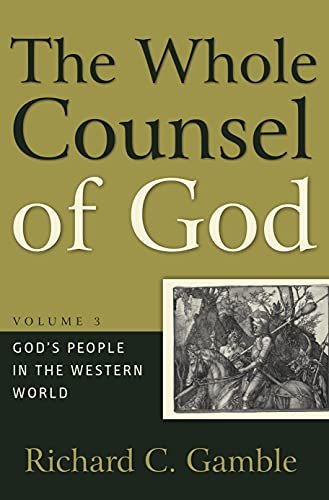God's People in the Western World - A Review
One of my regular critiques of many contemporary books is they are about 100 pages too long. Authors have often sufficiently explained their point, but because of contract stipulations or a lack of discipline, they continue writing after the book is done. This can be true of shorter books, but it is often true of longer books. Sometimes, however, long books have good cause to be long.
Richard Gamble’s book, The Whole Counsel of God: God’s People in the Western World, is a mammoth book that comes in at just under 1,100 pages. Despite its length, this volume is packed with valuable content from start to finish.
This latest book completes an impressive trilogy of theological writing. The first two volumes, God’s Mighty Acts in the Old Testament and The Full Revelation of God wrestle with the relationship between systematic and biblical theology, with a sound understanding of historical readings of the whole Bible. Volume three, God’s People in the Western World, is part historical theology and part church history. Gamble concludes the set by shifting from his more direct discussions of the text itself by setting the debates and efforts of Christian theologians in their cultural context for the whole of church history. This is an impressive feat.
Though there are certainly signs for concern within the church, there are also signs of hope. Among those signs is a growing interest in biblical theology that is often constructed along the framework of the Creation, Fall, Redemption narrative arc that provides shape to so much of Scripture. There are also pockets of increased engagement in systematic theology. However, historical theology tends to remain the neglected theological sister.
God’s People in the Western World provides a comprehensive overview of historical theology, tracing out the intellectual development of Christianity. He begins with a survey of the Greek philosophy that influenced the cultural context of the early church. These were the conversation partners early exegetes encountered and whose ideas had to be accounted for. The volume moves all the way through postmodernity, broader 20th century debates, and even into ongoing debates within Reformed circles.
Large volumes like this are often imposing and serve more as ballast for the bookshelf or, in the era of zoom calls, as trophies on the shelf to demonstrate one’s theological prowess. This is, however, a book that deserves to be read. It is not a fast read (what 1,100 page book is?) but it is a very readable volume. God’s People in the Western World moves through a vast sweep of history deliberately, but it does not drag. Neither does the volume depend on a strong background in theology. This may not be first place that an interested student should go to get an overview of church history and historical theology––a more concise overview might be a better place to begin that quest––but this a book that a student of theology can come back to time and again as a helpful reference.
Given that the book is published by P&R, it is not surprising there is a greater emphasis on the Reformation and Post-Reformation eras than on earlier thought. It is also not unexpected that there are discussions of theologians in the Reformed tradition that will be less familiar to those who haven’t attended one of the Reformed seminaries. This is a volume rooted in a particular tradition. That being said, the selection of these figures to discuss helps illuminate the debates that were ongoing during the time under discussion. All authors make choices of what to include and elide. Gamble’s choices make perfect sense within his tradition and context.
I found reading this volume slowly in the evenings an enjoyable exercise. This is the sort of book that is best consumed in chunks if one is to read it from cover to cover. Even having studied historical theology and the trajectory of Western thought in multiple formats previously, I found new insights in Gamble’s analysis from time to time. Often I was reminded of ideas I had previously encountered.
The most helpful use of this book will be as a reference volume. It has been meticulously researched and points to a great deal of primary literature. At the same time, it is a synthesis of those primary sources that can provide an entry point for readers trying to understand the thought of a particular era. Gamble provides a toe hold for understanding the intellectual context and situation within the broad sweep of Christian history.
God’s People in the Western World will be a solid resource for decades to come. The analysis is fair, the prose is readable, the scope is comprehensive. This is a real accomplishment and well worth the investment for pastors, homeschoolers, Christian schools, and lay people simply trying to figure out the trajectory of Christian thought throughout generations.
NOTE: I was given a gratis copy of this volume with no expectation of a positive review.













There’s no reason to doubt that Jesus was nailed to the cross. Ultimately, I trust what Scripture says about Jesus’s crucifixion because I also trust what it says about his resurrection. And that’s what we should be celebrating this week.